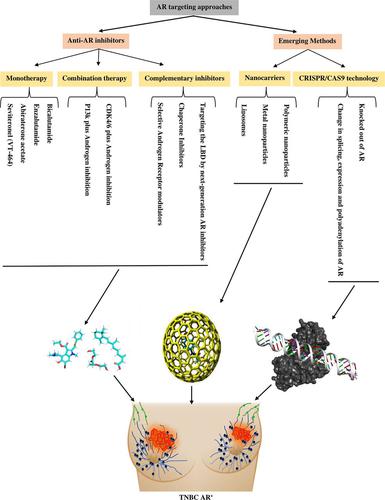当前位置:
X-MOL 学术
›
Pharmacol. Rev.
›
论文详情
Our official English website, www.x-mol.net, welcomes your feedback! (Note: you will need to create a separate account there.)
Newly Developed Targeted Therapies Against the Androgen Receptor in Triple-Negative Breast Cancer: A Review
Pharmacological Reviews ( IF 21.1 ) Pub Date : 2023-03-01 , DOI: 10.1124/pharmrev.122.000665 Edris Choupani 1 , Mohammad Mahmoudi Gomari 1 , Saeed Zanganeh 1 , Sherko Nasseri 1 , Kaveh Haji-Allahverdipoor 1 , Neda Rostami 1 , Yaeren Hernandez 1 , Safa Najafi 1 , Neda Saraygord-Afshari 2 , Arshad Hosseini 2
Pharmacological Reviews ( IF 21.1 ) Pub Date : 2023-03-01 , DOI: 10.1124/pharmrev.122.000665 Edris Choupani 1 , Mohammad Mahmoudi Gomari 1 , Saeed Zanganeh 1 , Sherko Nasseri 1 , Kaveh Haji-Allahverdipoor 1 , Neda Rostami 1 , Yaeren Hernandez 1 , Safa Najafi 1 , Neda Saraygord-Afshari 2 , Arshad Hosseini 2
Affiliation

|
Among different types of breast cancers (BC), triple-negative BC (TNBC) amounts to 15% to 20% of breast malignancies. Three principal characteristics of TNBC cells are (i) extreme aggressiveness, (ii) absence of hormones, and (iii) growth factor receptors. Due to the lack or poor expression of the estrogen receptor, human epidermal growth factor receptor 2, and progesterone receptor, TNBC is resistant to hormones and endocrine therapies. Consequently, chemotherapy is currently used as the primary approach against TNBC. Expression of androgen receptor (AR) in carcinoma cells has been observed in a subset of patients with TNBC; therefore, inhibiting androgen signaling pathways holds promise for TNBC targeting. The new AR inhibitors have opened up new therapy possibilities for BC patients carrying AR-positive TNBC cells. Our group provides a comprehensive review of the structure and function of the AR and clinical evidence for targeting the cell’s nuclear receptor in TNBC. We updated AR agonists, inhibitors, and antagonists. We also presented a new era of genetic manipulating CRISPR/Cas9 and nanotechnology as state-of-the-art approaches against AR to promote the efficiency of targeted therapy in TNBC.
中文翻译:

新开发的针对三阴性乳腺癌雄激素受体的靶向治疗:综述
在不同类型的乳腺癌 (BC) 中,三阴性乳腺癌 (TNBC) 占乳腺恶性肿瘤的 15% 至 20%。TNBC 细胞的三个主要特征是 (i) 极端攻击性,(ii) 没有激素,以及 (iii) 生长因子受体。由于雌激素受体、人表皮生长因子受体 2 和孕激素受体的缺乏或表达不足,TNBC 对激素和内分泌治疗具有抵抗力。因此,化疗目前被用作对抗 TNBC 的主要方法。在一部分 TNBC 患者中观察到癌细胞中雄激素受体 (AR) 的表达;因此,抑制雄激素信号通路有望实现 TNBC 靶向治疗。新的 AR 抑制剂为携带 AR 阳性 TNBC 细胞的 BC 患者开辟了新的治疗可能性。我们小组全面回顾了 AR 的结构和功能以及针对 TNBC 中细胞核受体的临床证据。我们更新了 AR 激动剂、抑制剂和拮抗剂。我们还介绍了基因操纵 CRISPR/Cas9 和纳米技术的新时代,作为对抗 AR 的最先进方法,以提高 TNBC 靶向治疗的效率。
更新日期:2023-02-14
中文翻译:

新开发的针对三阴性乳腺癌雄激素受体的靶向治疗:综述
在不同类型的乳腺癌 (BC) 中,三阴性乳腺癌 (TNBC) 占乳腺恶性肿瘤的 15% 至 20%。TNBC 细胞的三个主要特征是 (i) 极端攻击性,(ii) 没有激素,以及 (iii) 生长因子受体。由于雌激素受体、人表皮生长因子受体 2 和孕激素受体的缺乏或表达不足,TNBC 对激素和内分泌治疗具有抵抗力。因此,化疗目前被用作对抗 TNBC 的主要方法。在一部分 TNBC 患者中观察到癌细胞中雄激素受体 (AR) 的表达;因此,抑制雄激素信号通路有望实现 TNBC 靶向治疗。新的 AR 抑制剂为携带 AR 阳性 TNBC 细胞的 BC 患者开辟了新的治疗可能性。我们小组全面回顾了 AR 的结构和功能以及针对 TNBC 中细胞核受体的临床证据。我们更新了 AR 激动剂、抑制剂和拮抗剂。我们还介绍了基因操纵 CRISPR/Cas9 和纳米技术的新时代,作为对抗 AR 的最先进方法,以提高 TNBC 靶向治疗的效率。



























 京公网安备 11010802027423号
京公网安备 11010802027423号